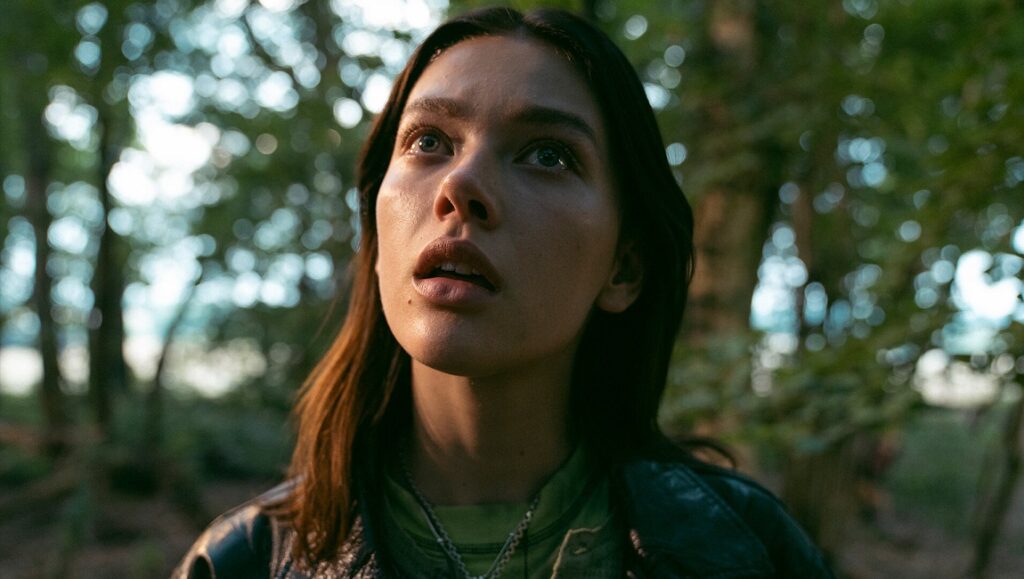A Banquet is atmospherically impressive for its first two acts, but doesn’t quite know how to stick the landing.
The decision to eat or abstain is one that haunts women throughout Western narratives. Whether it is Alice, in Wonderland, eating as the first step of an adventure, or the sisters of Christina Rossetti’s “Goblin Market,” imperiled by their consumption of goblin fruit, or even the tendency of female saints to starve themselves as a spiritual practice, women (especially young women) in stories have always had a complex relationship with what they consume. Add to that the hetero-patriarchal expectation of women as caregivers, and food becomes a socially acceptable means of expressing love, whether it be familial or romantic. In Lucas Malet’s little-remembered Victorian ghost story The Gateless Barrier, food is the ultimate bridge between worlds, a sensual, grounding force that will bring the protagonist’s ghostly lover back to the realm of the living. In the novel’s climactic scene, he begs her to eat anything, just a single morsel, laying out a tremendous feast of both the most extravagant and most simple of foods to tempt her. She steadfastly refuses, knowing that his world is not for her.
Ruth Paxton’s atmospheric horror A Banquet continues in this tradition, even mirroring Malet’s finale as a launch point rather than a conclusion. A Banquet follows a mother and daughter, Holly (Sienna Guillory) and Betsey (Jessica Alexander), as the latter begins a campaign of starvation, claiming that her body is now in service to a higher power, and proceeds to trace the ensuing familial angst. Paxton makes her own addition to the genre an almost entirely female affair, maintaining a tight focus on four women across three generations. The absence of men is a deliberate one, with the loss of a husband and father coming as a result of a fatal encounter with food. As such, when Holly cooks and Betsey refuses, the gesture is loaded with layers of meaning — distrust, rejection of parental love, and fear of meeting a similar demise all figure into her decision. Paxton creates a narrative rich with the kind of subtext many modern horror movies so desperately lack — with a premise like this, audiences might expect a textbook example of allegorical horror, given the current glut of this subgenre, but while Paxton does give brief consideration to the most obvious of fears (that Betsey, like many teenage girls, has developed anorexic tendencies, and her mother is helpless to intervene), A Banquet refuses to stop there, drawing on the complex narrative history between women and food, everything from St. Genevieve to the Japanese tale of the futakuchi-onna to The Exorcist.
With such a rich bank of subtext and a backdrop of impressively sterile, seemingly subterranean sets in which Holly struggles desperately to maintain some semblance of a normal family life, Paxton’s chamber-horror arrives loaded with immense potential. Sienna Guillory hits the mark as a fraught mother, driven to the edge of reason by her daughter’s condition, and Lindsay Duncan’s appearance as the family’s shrewd grandmother is as memorable as audiences would expect from the veteran actress. Jessica Alexander’s performance as the mysterious Betsey, meanwhile, admittedly leaves something to be desired, her earnestness coming across as slightly too over-eager, but it’s still passable enough work so as not to distract. For her part, Paxton excels at building atmosphere, establishing a constant, mild sense of dread throughout. But where she fails, unfortunately, is in sticking the landing. Despite two acts of solid build-up and mood establishment, A Banquet is surprisingly, detrimentally low on any actual scares, featuring only one sequence that actually delivers on its horror promises. The film’s third act, then, somewhat falls apart given this dearth, with an anticlimactic ending that feels derivative of Rose Glass’s recent Saint Maud, which treads similar thematic ground. It’s a distinctly disappointing end to a promising film, though the first two acts certainly mark Paxton as a horror filmmaker with remarkable potential, and should leave viewers in eager anticipation for her next, hopefully fuller feature.


Comments are closed.